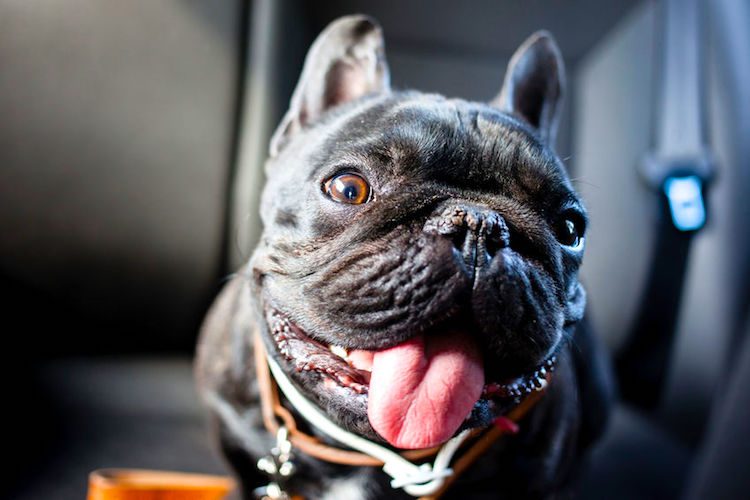When it comes to French Bulldogs, many people wonder if they have lockjaw. This is a question that has sparked curiosity among dog owners and enthusiasts alike. However, the truth is that French Bulldogs do not have lockjaw. It is a common misconception that this breed is prone to this condition, but in reality, they do not possess any unique anatomical features that would cause lockjaw. So, if you’re considering adding a French Bulldog to your family, rest assured that lockjaw is not a concern specific to this breed.
To understand why French Bulldogs do not have lockjaw, it’s important to delve into the background of this condition. Lockjaw, also known as tetanus, is a condition that affects the muscles and nervous system, causing prolonged muscle contractions. While certain breeds may be more susceptible to developing lockjaw, it is not exclusive to any particular breed. In fact, lockjaw is typically caused by a bacterial infection rather than genetic predisposition. By maintaining good hygiene practices and ensuring your French Bulldog receives proper veterinary care, you can minimize the risk of lockjaw and keep your furry friend healthy and happy.
Lockjaw, also known as tetanus, is not specific to French Bulldogs. It is a rare condition that can affect any dog breed, including French Bulldogs. Lockjaw occurs as a result of bacterial infection and causes muscle stiffness, including in the jaw. While French Bulldogs can potentially develop lockjaw, it is important to note that the condition is preventable through proper vaccination and overall good health care. Regular veterinary check-ups and vaccinations can help keep your French Bulldog healthy and reduce the chances of lockjaw.

The Truth About French Bulldogs and Lockjaw
French Bulldogs are beloved for their adorable appearance and comical personalities. However, there have been rumors and misconceptions surrounding the breed, such as the idea that they have lockjaw. In this article, we will explore the truth behind this belief and provide you with accurate information about French Bulldogs and lockjaw.
Lockjaw, also known as tetanus or trismus, is a condition characterized by the tightness and stiffness of the muscles in the jaw. It can make opening the mouth difficult or even impossible. Many people associate this condition with certain dog breeds, including French Bulldogs. However, the truth is that French Bulldogs do not have lockjaw.
Let’s delve deeper into the topic to understand why French Bulldogs do not suffer from lockjaw.
1. Genetic Differences
Lockjaw is not a condition that is genetically predisposed in French Bulldogs. Different dog breeds may have different susceptibilities to certain health conditions, but lockjaw is not one of them for French Bulldogs.
The misconception may stem from the fact that French Bulldogs have a unique facial structure compared to other breeds. Their short snout and underbite can make it appear as if they have a locked jaw. However, this is simply a physical characteristic and not a medical condition.
It’s important to note that while French Bulldogs do not have lockjaw, they may be prone to other health issues due to their brachycephalic (short-muzzled) features. These include breathing difficulties and temperature sensitivity. Responsible breeding practices and regular veterinary care can help minimize these risks.
2. Jaw Structure and Muscles
The structure of a French Bulldog’s jaw is different from that of other breeds, but this does not cause lockjaw. Their jaw may appear more robust due to the shape and size of their muscles and bones. However, this is a normal variation within the breed and does not indicate a medical condition.
French Bulldogs have a strong bite force, which can be deceiving and might contribute to the belief that they have lockjaw. Their muscles are well-developed in order to chew and consume food properly. This, coupled with their unique facial structure, can make it seem as if their jaws are locked, but it is simply their natural anatomy.
3. Oral Health and Care
Proper oral health and care are essential for all dog breeds, including French Bulldogs. Regular dental check-ups and professional cleanings can help maintain good oral hygiene and prevent any potential issues, including dental diseases.
French Bulldogs are prone to dental problems due to their unique jaw and teeth structure. They may be more susceptible to issues like overcrowding, misalignment, or periodontal disease. It’s crucial to establish a dental care routine and provide appropriate dental chews or toys to promote healthy teeth and gums.
The Importance of Accurate Information
Dispelling myths and providing accurate information about dog breeds is crucial for their well-being. In the case of French Bulldogs and lockjaw, it is essential to understand that they do not have this condition. The misconception can lead to unnecessary worry or misunderstanding, which can impact the perception and care of these beloved pets.
Conclusion
French Bulldogs do not have lockjaw. The belief that they do is a misconception that stems from their unique facial structure and strong bite force. Understanding the facts about French Bulldogs’ jaw anatomy and oral health is essential for providing them with appropriate care and debunking any false information.
Frequently Asked Questions
Do all French Bulldogs have the same jaw structure?
While French Bulldogs share certain physical characteristics, each individual may have slight variations in their jaw structure. Some may have a more pronounced underbite, while others may have a more open jaw angle. These differences are normal within the breed and do not indicate the presence of lockjaw.
Can French Bulldogs experience other jaw-related issues?
French Bulldogs can experience dental issues, including overcrowding or misalignment of teeth. They may also be prone to developing periodontal disease if proper dental care is not maintained. Regular dental check-ups and professional cleanings can help address these issues and maintain their oral health.
Are French Bulldogs prone to any other health issues?
While French Bulldogs do not have lockjaw, they can be prone to other health issues due to their brachycephalic features. Some of these include breathing difficulties, heat intolerance, skin fold dermatitis, and spinal problems. Regular veterinary care, responsible breeding, and appropriate lifestyle adjustments can help minimize these risks.
The Verdict
The belief that French Bulldogs have lockjaw is a myth. They do not suffer from this condition. Their unique facial structure and powerful bite force can give the false impression of a locked jaw, but in truth, it is simply their natural anatomy. Understanding this fact and providing appropriate care is essential for the well-being of French Bulldogs.
| Fact | Myth |
| French Bulldogs do not have lockjaw. | French Bulldogs have lockjaw. |
| Their unique facial structure can make their jaws appear locked. | Their jaws are physically locked. |
| Regular dental care is important for their oral health. | They are not prone to any oral health issues. |
Key Takeaways – Do French Bulldogs Have Lockjaw?
Lockjaw is not a common condition in French Bulldogs.
The term “lockjaw” refers to a condition called tetanus, which is extremely rare in dogs.
It is important to keep your French Bulldog’s jaw and teeth healthy through regular dental care and appropriate chew toys.
French Bulldogs are known for their strong jaws, but they do not have a tendency to lock their jaw.
If you have concerns about your French Bulldog’s jaw or any other health issues, consult with a veterinarian.
Frequently Asked Questions
In this section, we will address some common questions about French Bulldogs and whether they have lockjaw. Lockjaw refers to a condition where a dog’s jaw becomes tightly clenched and difficult to open. Let’s explore this topic further.
1. Are French Bulldogs prone to lockjaw?
French Bulldogs are not specifically prone to lockjaw. Lockjaw, also known as tetanus, is a serious bacterial infection that affects the nervous system. While any dog can potentially get tetanus, it is not common in French Bulldogs. Tetanus is more commonly associated with injuries or wounds that become contaminated with the bacteria causing the infection.
It’s important to note that French Bulldogs, like any other breed, can still experience jaw issues or temporomandibular joint disorders (TMJ). These conditions can cause discomfort or difficulty with jaw movement, but they are not the same as lockjaw.
2. What are the signs of lockjaw in French Bulldogs?
As lockjaw is not common in French Bulldogs, it is crucial to prioritize other potential health concerns that may affect the jaw. Signs of jaw issues in French Bulldogs may include:
- Difficulty opening or closing the jaw
- Clicking or popping sounds when the jaw is moved
- Reluctance to eat or chew hard food
- Excessive drooling
If you notice any of these signs, it is recommended to consult a veterinarian for a thorough examination and proper diagnosis.
3. How can I prevent jaw issues in my French Bulldog?
While it may not be possible to prevent all jaw issues, there are steps you can take to promote your French Bulldog’s oral health and reduce the risk of certain problems. Here are some preventive measures:
- Provide a balanced and nutritious diet to support overall health, including strong teeth and jaw muscles.
- Encourage regular dental care, such as teeth brushing or using dental chews recommended by your veterinarian.
- Avoid giving your French Bulldog excessively hard or chew toys that may cause jaw strain.
- Regularly check your dog’s mouth for any signs of inflammation, sores, or other abnormalities.
Remember, routine visits to the veterinarian for dental check-ups and overall health evaluations are essential for maintaining your French Bulldog’s well-being.
4. How is jaw-related discomfort or disorders treated in French Bulldogs?
If your French Bulldog is experiencing jaw-related discomfort or disorders, it is best to consult a veterinarian for a proper diagnosis and treatment plan. Treatment options may vary depending on the specific issue and can include:
- Medications to manage pain and reduce inflammation
- Physical therapy exercises to improve jaw mobility
- Surgical interventions in more severe cases
Your veterinarian will provide guidance tailored to your dog’s individual needs and condition.
5. What are some other common health concerns in French Bulldogs?
French Bulldogs may be prone to certain health issues, including:
- Brachycephalic airway syndrome
- Skin allergies
- Eye problems, such as cherry eye or corneal ulcers
- Joint and bone disorders
- Obesity
If you own a French Bulldog, regular veterinary check-ups, a balanced diet, and providing appropriate exercise and mental stimulation can help reduce the risk of these health concerns and ensure your furry friend’s well-being.

In conclusion, it is a common misconception that French Bulldogs have lockjaw. However, this is not true.
While French Bulldogs may have a strong bite, they do not have any special mechanism that causes their jaws to lock.
